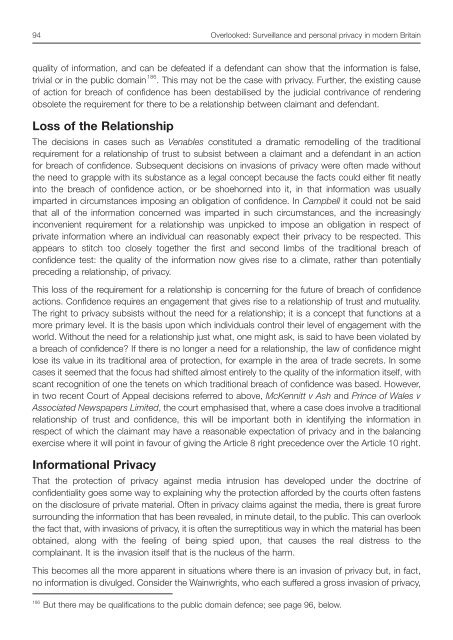Overlooked - Liberty
Overlooked - Liberty
Overlooked - Liberty
You also want an ePaper? Increase the reach of your titles
YUMPU automatically turns print PDFs into web optimized ePapers that Google loves.
94 <strong>Overlooked</strong>: Surveillance and personal privacy in modern Britain<br />
quality of information, and can be defeated if a defendant can show that the information is false,<br />
trivial or in the public domain 186 . This may not be the case with privacy. Further, the existing cause<br />
of action for breach of confidence has been destabilised by the judicial contrivance of rendering<br />
obsolete the requirement for there to be a relationship between claimant and defendant.<br />
Loss of the Relationship<br />
The decisions in cases such as Venables constituted a dramatic remodelling of the traditional<br />
requirement for a relationship of trust to subsist between a claimant and a defendant in an action<br />
for breach of confidence. Subsequent decisions on invasions of privacy were often made without<br />
the need to grapple with its substance as a legal concept because the facts could either fit neatly<br />
into the breach of confidence action, or be shoehorned into it, in that information was usually<br />
imparted in circumstances imposing an obligation of confidence. In Campbell it could not be said<br />
that all of the information concerned was imparted in such circumstances, and the increasingly<br />
inconvenient requirement for a relationship was unpicked to impose an obligation in respect of<br />
private information where an individual can reasonably expect their privacy to be respected. This<br />
appears to stitch too closely together the first and second limbs of the traditional breach of<br />
confidence test: the quality of the information now gives rise to a climate, rather than potentially<br />
preceding a relationship, of privacy.<br />
This loss of the requirement for a relationship is concerning for the future of breach of confidence<br />
actions. Confidence requires an engagement that gives rise to a relationship of trust and mutuality.<br />
The right to privacy subsists without the need for a relationship; it is a concept that functions at a<br />
more primary level. It is the basis upon which individuals control their level of engagement with the<br />
world. Without the need for a relationship just what, one might ask, is said to have been violated by<br />
a breach of confidence If there is no longer a need for a relationship, the law of confidence might<br />
lose its value in its traditional area of protection, for example in the area of trade secrets. In some<br />
cases it seemed that the focus had shifted almost entirely to the quality of the information itself, with<br />
scant recognition of one the tenets on which traditional breach of confidence was based. However,<br />
in two recent Court of Appeal decisions referred to above, McKennitt v Ash and Prince of Wales v<br />
Associated Newspapers Limited, the court emphasised that, where a case does involve a traditional<br />
relationship of trust and confidence, this will be important both in identifying the information in<br />
respect of which the claimant may have a reasonable expectation of privacy and in the balancing<br />
exercise where it will point in favour of giving the Article 8 right precedence over the Article 10 right.<br />
Informational Privacy<br />
That the protection of privacy against media intrusion has developed under the doctrine of<br />
confidentiality goes some way to explaining why the protection afforded by the courts often fastens<br />
on the disclosure of private material. Often in privacy claims against the media, there is great furore<br />
surrounding the information that has been revealed, in minute detail, to the public. This can overlook<br />
the fact that, with invasions of privacy, it is often the surreptitious way in which the material has been<br />
obtained, along with the feeling of being spied upon, that causes the real distress to the<br />
complainant. It is the invasion itself that is the nucleus of the harm.<br />
This becomes all the more apparent in situations where there is an invasion of privacy but, in fact,<br />
no information is divulged. Consider the Wainwrights, who each suffered a gross invasion of privacy,<br />
186<br />
But there may be qualifications to the public domain defence; see page 96, below.















